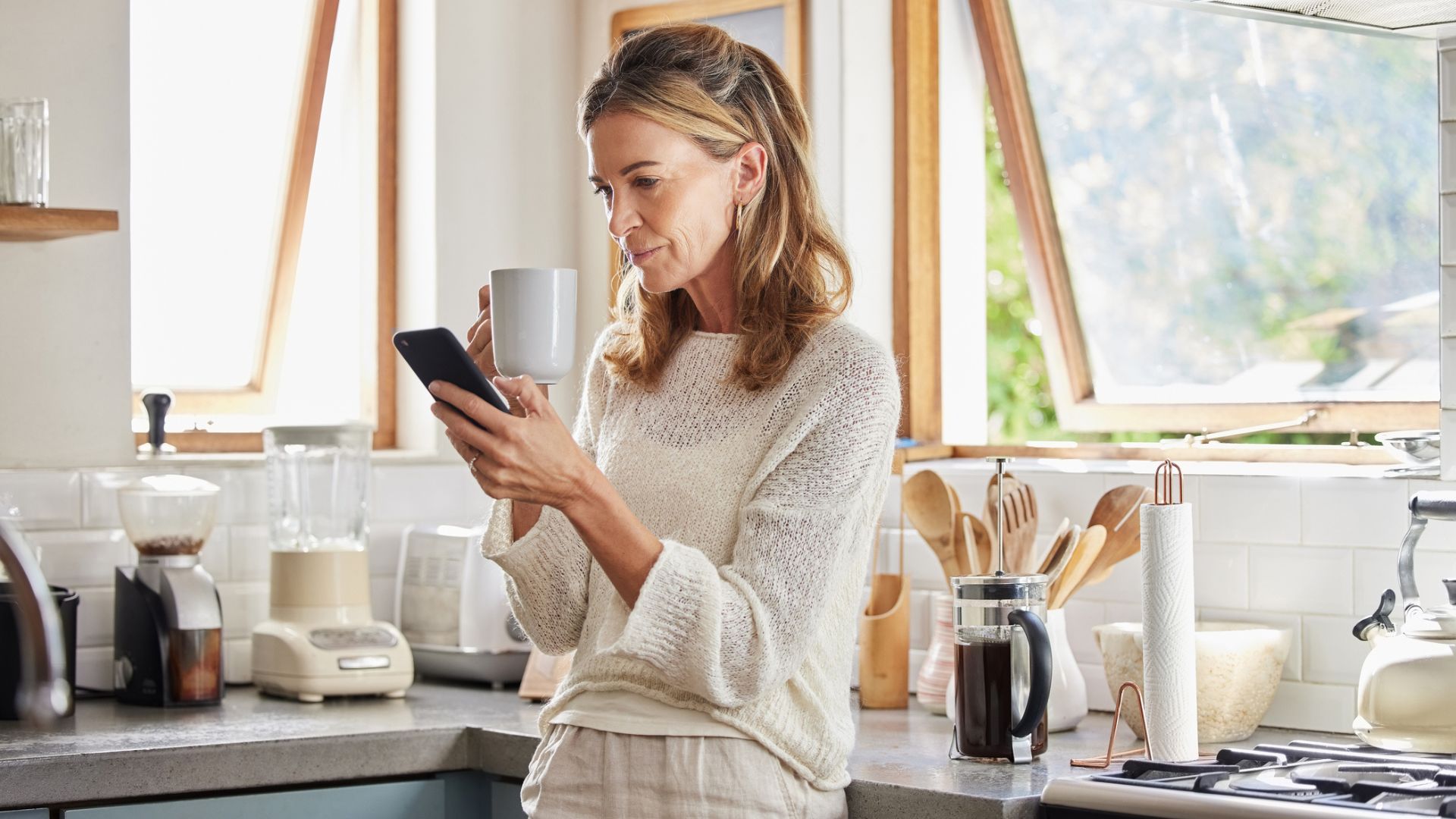What causes constipation? Doctors reveal 8 common reasons and how to avoid discomfort
Constipation is one of the most common health issues in the world. It's easily fixed - but can have long-term problems if you don't


Wondering what causes constipation? If you're feeling uncomfortable and unable to use the bathroom, it's good to know what could be behind it.
Being one of the causes of bloating, nausea, stomach pain and even back ache, constipation can seriously impact day-to-day life for many people. The NHS and National Institute on Aging suggest that 15% of adults under 60 regularly experience symptoms of constipation, a number that rises to 33% over this age.
But constipation can be caused by something as simple as medication or lifestyle habits, so it's often easy to identify the cause and prevent it from happening again. Here, woman&home speaks to several gastroenterology specialists and dietitians to reveal what causes constipation and how to ease discomfort.
What causes constipation?
1. Not enough fibre in your diet
One of the most common causes of constipation is not getting enough fibre in your diet, says Dr Chun Tang, a GP and the medical director at Pall Mall.
"Fibre helps keep things moving smoothly through your digestive system, so if you’re eating a lot of processed foods, meats, or dairy, but not enough fruits, vegetables, or whole grains, things can slow down," he says. Adding high-fibre foods to your diet, such as berries and fibrous green vegetables, can make a difference.
Other dietary habits that may cause constipation include eating too much dairy. According to research by the Medical University of Gdańsk, lactose intolerance accounts for 30% of constipation cases.

Dr Chun Tang is a GMC registered GP offering a private general practice and a range of family healthcare services at our clinics in Manchester and Newton Le-Willows. He has a superior understanding of acute and chronic disease management, with 15 year’s experience in a primary care setting.
2. Not drinking enough water
Hydration is key to every bodily function - so it's hardly surprising that not drinking enough water can affect our intestinal health.
Sign up for the woman&home newsletter
Sign up to our free daily email for the latest royal and entertainment news, interesting opinion, expert advice on styling and beauty trends, and no-nonsense guides to the health and wellness questions you want answered.
“When you’re not drinking enough water, your body pulls moisture from wherever it can, including your stools. This can make them harder to pass. So, if you’re not hydrating properly, it’s like your intestines are trying to push out little rocks instead of something soft and easy," says Dr Tang, who has created his own at-home bowel and colorectal cancer test called ColoAlert.
3. Poor gut health
While there is no one measure of ‘gut health’, some classic signs that your gut may need some attention is if you’re experiencing symptoms like constipation, says Dr Sammie Gill, a registered gastroenterology dietitian who works with Symprove.
"Your toilet habits can tell you a lot about the inner workings of your gut. Ideally, stools should be soft, bulky and easy to pass. An interesting recent study by the University of Washington found that how often you poo has a real impact on your overall health," she says.
"The researchers asked over 1400 healthy people to record daily how many times they went to the toilet and results showed that gut microbiome composition changed according to stool frequency. For example, if you use the toilet less, the non-digestible food remnants (such as fibre) hang around in your gut longer. With constipation (only going once or twice a week), they switch to fermenting proteins after microbes have fermented and depleted fibre sources. This can lead to the release of harmful compounds that make their way into the bloodstream."
Dr Sammie Gill is a registered dietitian and Research and Development Manager at Symprove. She has previously worked as a Policy Officer in Evidence-Based Practice at the British Dietetic Association (BDA), as a Postdoctoral Research Associate at King’s College London investigating nutritional interventions in the management of gastrointestinal disorders, and most recently as a specialist gastroenterology dietitian in the NHS.
4. Ignoring the need to 'go'
No one likes using the loo in public but when you have to 'go', it's important to 'go'. "When stool stays in the colon for longer than necessary, the colon continues to absorb water from it. The longer the stool remains, the more water is reabsorbed, making the stool harder, drier, and more difficult to pass," says Debbie Grayson, a pharmacist and nutritional therapist who founded Digestion With Confidence.
If you do it frequently, it can also cause long-term problems. "Ignoring the urge can lead to reduced sensitivity in the rectum as well. Over time, the body becomes less responsive to the signals that indicate it’s time to have a bowel movement. This can make it harder to detect the need to go and delay bowel movements even further, worsening constipation," she says.
Debbie Grayson is a highly-respected pharmacist and nutritional therapist who runs Digestion With Confidence, a groundbreaking network of practitioners on a mission to help improve the digestion of people across the world. She brings over 25 years experience of working as a highly respected pharmacist to her nutrition practice and is widely regarded as the expert in the field of interactions between the patient, prescribed medication and nutritional supplements and herbs.
5. Ageing
While ageing doesn't directly cause constipation, those who are older are more likely to suffer from the condition than younger people.
"As we age, the muscles in the digestive tract, especially in the colon, can lose some strength and efficiency slowing down peristalsis (muscle contractions that move food and other substances through the body)," says Grayson.
It can also be a lifestyle issue, she notes. "Older adults can be less physically active due to mobility issues, chronic health conditions, or a sedentary lifestyle. Movement stimulates the digestive system and helps promote regular bowel movements. Also, older people often have a reduced sensation of thirst and can easily be dehydrated, leading to harder stools because with less water available to soften them."
With age comes an increased risk of certain illnesses as well, such as type 2 diabetes, Parkinson's, stroke, Alzheimer's and dementia - all of which can affect bowel movements, says Dr Deborah Lee, a women's health specialist who works with Dr Fox Online Pharmacy.
"Some older people can be embarrassed to discuss their bowels and may not tell anyone they are having trouble until things have got out of hand," she adds.

Dr Deborah Lee has worked for several years in the NHS as a lead clinician. She now works mostly as a medical writer specialising in nutrition, women's health, and menopausal care.

Drinking enough water and getting regular exercise are two simple ways to avoid constipation.
6. Not doing enough exercise
Exercise has so many benefits, from helping to maintain muscle through menopause to boosting cardiovascular health and mental wellbeing. It also plays a big role in keeping the digestive system functioning.
"When you’re inactive - whether it’s from sitting all day at work or simply not getting enough exercise - your intestines can become sluggish too. Think of it like a lazy river: if there’s no current (or movement), everything just sits there," says Dr Tang.
7. Some medications
Medication is another common cause of constipation, so much so that it wouldn't be possible to list all the medications that cause it.
"The rate at which the gastrointestinal contents pass along the GI tract depends on the fibre and fluid content, the neuromuscular function of the bowel wall and the fact there is no obstruction to the passage of the GI contents. Many different types of medication can affect these parameters," says Dr Lee.
Some medications that cause constipation include:
- Antidepressants (SSRIs and TCAs)
- Calcium channel blockers: "These are most often used to treat hypertension and coronary heart disease," says Dr Lee.
- Iron supplements
- Ibuprofen: "Around 1 in 10 patients taking ibuprofen will experience constipation," the doctor says.
8. Travel
If you've been on the move a lot lately - whether that's going on holiday or moving house - you might find your digestive system isn't working like it normally would.
"The body’s internal clock (circadian rhythm) influences digestion and bowel regularity. Changing time zones or altering your normal schedule can disrupt this rhythm," says Grayson.
Travelling also tends to affect our eating habits, which have a direct influence on digestion and bowel habits, and we tend to drink less water on the move as well. "Dehydration causes the colon to absorb more water from the stool, leading to harder, drier stools and constipation," she says.
"Many people experience travel constipation due to the stress of being in an unfamiliar place or worrying about bathroom availability and anxiety can cause the muscles in the digestive tract to tense up, slowing down bowel movements," she says.
Can constipation cause back pain?
Surprisingly, constipation can cause lower back pain for many people. "When stool builds up in the intestines, it can create a lot of pressure, especially in the lower abdomen and pelvic area," says Dr Tang.
"This pressure can push on nerves in your back, causing discomfort or pain. Think of it like a balloon that's been overfilled - eventually, that extra pressure is going to make something else feel the strain. So, if you're blocked up, your back might feel it too."
Can constipation cause nausea?
Nausea and constipation, unfortunately, go hand-in-hand as well. "When your bowels are backed up, the waste that’s supposed to leave your body stays in your system longer than it should. This can make you feel bloated, uncomfortable, and yes, nauseous," says Dr Tang.
"The trapped waste puts pressure on your digestive system, which can lead to that upset, nauseous feeling." It's also one of the most common causes of bloating.
Constipation home remedies
- Switching to a mainly plant-based diet: Plant-based foods are rich in different types of fibre, so focus on wholegrains, fruit, vegetables, nuts, seeds, and legumes, says Dr Gill. "Certain fibres can bulk out your stool, improving consistency and making it soft and easier to pass. Gradually increase fibre intake through plant-based foods to give your gut time to adapt as well."
- Eat two kiwis a day: These fibrous green fruits sit among the best gut-healthy foods. "Studies have shown that eating two kiwis per day for 4 weeks reduces straining, increases gut transit time, as well as improving poop frequency and discomfort in those with constipation," says Dr Gill. "Start with 1 for the first week, see how you go, then build up to 2 and it’s best to eat them with the skins on."
- Drink plenty of water: "Hydration is often overlooked in constipation, but it’s actually really important. The gut needs adequate fluids to function properly and for maintenance of digestive processes," says Dr Gill.
- Exercise regularly: Most experts (and the NHS) recommend at least 150 minutes of moderate-intensity exercise or 75 minutes of high-intensity exercise every week. If you find yourself short on time - try exercise snacking, like jogging on the spot or going up and down the stairs in one-minute bursts.
- Avoid dairy: With lactose intolerance accounting for up to a third of constipation cases, it's worth cutting back on dairy consumption and seeing if it makes a difference if you're feeling uncomfortable. If you are lactose intolerant, cheese, milk, butter and yoghurt will sit among the worst foods for gut health.
When to see a doctor about constipation
While constipation is a temporary condition, more often than not, it's important to see a doctor if you notice you go for long periods between passing a bowel movement.
"Stool frequency is hugely variable from person to person. Anything from three times per day to three times per week is considered ‘normal’. If it’s getting you down or affecting your quality of life, go and see your GP," says Dr Gill.
"Also, if you’re noticing any other symptoms like blood in your stool, unexplained weight loss, or severe abdominal discomfort, it’s time to seek medical help," says Dr Tang. "Constipation can sometimes be a sign of something more serious, so don’t hesitate to get it checked out if it’s persistent or worrying."

Grace Walsh is woman&home's Health Channel Editor, working across the areas of fitness, nutrition, sleep, mental health, relationships, and sex. She is also a qualified fitness instructor. In 2025, she will be taking on her third marathon in Brighton, completing her first ultra marathon, and qualifying as a certified personal trainer and nutrition coach.
A digital journalist with over seven years experience as a writer and editor for UK publications, Grace has covered (almost) everything in the world of health and wellbeing with bylines in Cosmopolitan, Red, The i Paper, GoodtoKnow, and more.
-
 This £10 primer is the only thing that can make my foundation last past lunchtime
This £10 primer is the only thing that can make my foundation last past lunchtimee.l.f. Power Grip Primer is the budget buy our oily-skinned Beauty Editor, Jess Beech, can't live without
By Jess Beech Published
-
 The eye cream Reese Witherspoon uses to banish 'concealer creasing' and puffiness was already a bargain - now it's on sale
The eye cream Reese Witherspoon uses to banish 'concealer creasing' and puffiness was already a bargain - now it's on saleThe inexpensive eye cream Reese Witherspoon uses to reduce puffiness, dark circles and creases in her concealer is even more affordable than usual today.
By Charlie Elizabeth Culverhouse Published